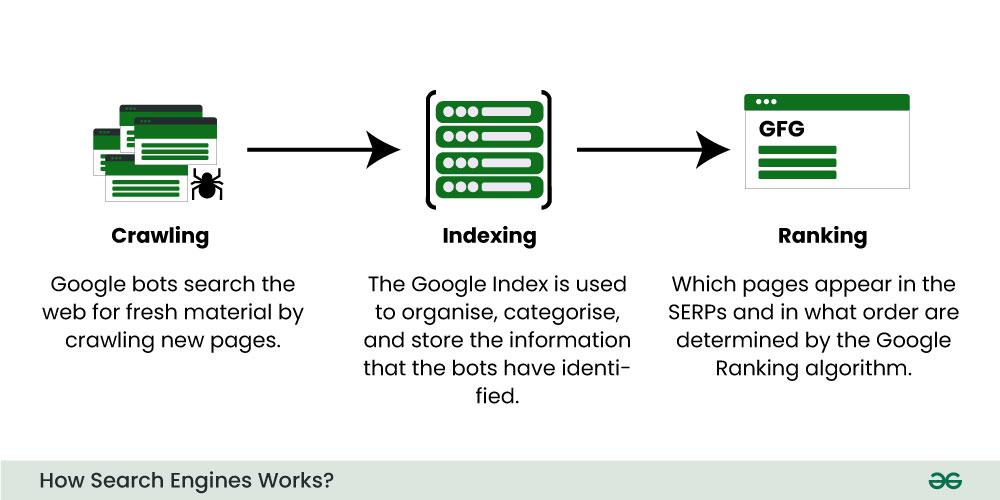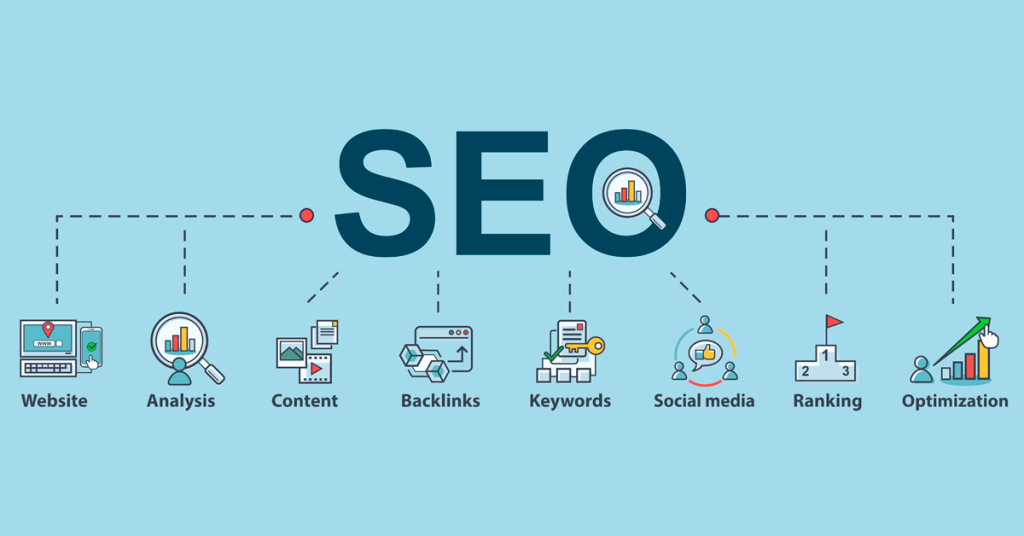Introduction
Having a website is no longer sufficient in the digital age, where practically every company, group, and person has an online presence. With billions of webpages on the internet, being visible is more important than having a visually appealing website if you want to stand out from the crowd. Search Engine Optimization (SEO) is useful in this situation.
Optimizing online content to rank higher in search results on search engines like Google, Bing, and Yahoo is the art and science of search engine optimization, or SEO. To put it another way, SEO makes your website show up at the top of search results for phrases associated with your company. More visits, more leads, and increased trust are all produced by a well-optimized website. This article explores what SEO is, how it works, its different types, key practices, and why it’s essential for online success.
What is SEO?

The technique of increasing a website’s exposure in natural (non-paid) search engine results is known as search engine optimization, or SEO. Users are more inclined to visit a website with more exposure. SEO includes a number of tactics that assist search engines in comprehending your website’s content and matching it with pertinent search terms.
Google employs sophisticated algorithms to determine which pages are the most reliable and pertinent when a user enters a query. By raising a website’s ranking in these results, SEO increases the likelihood that it will be clicked.
Why is SEO Important?

on advertisements, SEOSEO is important for a number of reasons:
Enhanced Traffic and Visibility: Getting ranked on the first page of search results greatly increases the number of visitors to your website.
Cost-effective Marketing: Without spending moneyCost-effective marketing: SEO generates organic traffic and long-term results without requiring advertising expenditures.
Development of Credibility and Trust: People tend to view websites with higher rankings as more reliable.
Improved User Experience: Effective SEO techniques make websites faster and easier to use.
Competitive advantage: Companies that make SEO investments frequently fare better than those that don’t.
How Do Search Engines Work?

- Crawling
Robots, also referred to as “bots” or “spiders,” are sent out by search engines to surf the internet and click on links to find new or updated material.
- Indexing
After locating a page, the search engine saves its contents in an index, which is a sizable database. This index contains details about each page’s structure, relevancy, keywords, and content.
- Ordering
When a user searches, the search engine looks through its index and offers the most relevant results, which are rated according to hundreds of criteria including mobile friendliness, page speed, content quality, and keyword use.
Types of SEO

Each of the three primary forms of SEO focuses on a distinct facet of website optimization.
- SEO on-page
Optimizing the content and layout of your website’s pages is known as “on-page SEO.” This comprises:
Using pertinent keywords that your target audience is searching for is known as keyword optimization.
Title Tags and Meta Descriptions: Keyword-rich, enticing titles and summaries.
Header Tags (H1, H2, H3): Using headers to organize material enhances readability and structure.
Internal linking is the process of joining relevant pages on your website to direct users and aid search engines in comprehending the hierarchy of your site.
Image optimization includes providing descriptive alt text and compressing photos.
URL structure should be clear and informative (e.g., www.example.com/seo-guide).
- SEO Off-Page
Activities carried out outside of your website that have an impact on your rankings are the topic of off-page SEO.
Backlinks are links leading to your website from other websites. Trust and authority are communicated via high-quality backlinks.
Social Sharing: Information posted on social media sites has the potential to increase traffic and establish connections.
Brand Mentions: Brand mentions contribute to the development of your internet presence even if they are not connected.
Writing material for other websites in order to gain backlinks and establish authority is known as guest blogging.
- Technical search engine optimization
Optimizing your website’s backend structure to aid search engines in more effectively crawling and indexing it is known as technical SEO.
Website Speed: Websites that load faster provide a better user experience and rank higher.
Mobile Optimization: Since the majority of people access websites via smartphones, they must be responsive.
HTTPS (Secure Site): SSL certificates give websites security and reliability.
XML sitemaps: Assist search engines in comprehending the organization of the website.
Search engines are instructed on which pages to crawl or ignore via the Robots.txt file.
SEO Best Practices

Best Practices for SEO
To raise your ranks, use these tried-and-true SEO recommended practices:
- Perform research on keywords
Use tools such as Google Keyword Planner, Ahrefs, or SEMrush to find out what your target audience is searching for. Pay attention to both long-tail (like “how to improve SEO for small businesses”) and short-tail (like “SEO”) keywords.
- Produce Superior Content
At its core, SEO is content. Concentrate on producing insightful, unique, and useful material that responds to user inquiries and promotes interaction.
- Make Mobile Optimization
More than half of all internet traffic comes from mobile devices, therefore having a responsive, mobile-friendly website is crucial.
- Increase the Speed of Pages
Pages that load slowly have greater bounce rates. To find and address performance issues, use tools such as Google PageSpeed Insights.
Common SEO Mistakes to Avoid

Typical SEO Errors to Steer Clear of
Keyword stuffing can result in fines and render material illegible.
Ignoring Mobile Users: You risk losing a lot of traffic if you don’t optimize for mobile devices.
Duplicate material: Search engines become confused when the same material appears on several pages.
Not Using Analytics: It’s difficult to determine what’s working if performance isn’t tracked.
Bad Link-Building Practices: Using black-hat tactics or purchasing backlinks might lead to penalties.
Conclusion
In the current digital marketing environment, search engine optimization, or SEO, is an essential tool. Delivering value, enhancing user experience, and establishing long-term credibility are more important than simply ranking your website high in search engine results. More traffic, improved exposure, and increased revenue are just a few advantages of investing in SEO, regardless of whether you’re a blogger, small business owner, or employee of a huge firm.
Even while SEO calls for patience and constant work, the benefits persist. Anyone can use SEO to increase their online presence and thrive in the digital age by comprehending the basics, putting best practices into practice, and keeping up with industry developments.
FAQ’S
What does SEO stand for, and what does it mean?
Search Engine Optimization is referred to as SEO. It describes the process of making a website more visible in organic (non-paid) search engine results by making technological, structural, and content changes to raise its ranking on search engines like Google or Bing.
Why is SEO important for websites and businesses?
Without spending money on paid advertising, SEO helps websites rank higher in search engine results, increasing visibility, bringing in more organic visitors, establishing credibility, and producing more leads or sales.
What are the main types of SEO?
Three primary categories of SEO exist:
Optimizing your website’s HTML, content, and keywords is known as on-page SEO.
Off-Page SEO: Establishing credibility via external promotion and backlinks.
Technical SEO: Enhancing the general structure, indexing, mobile usability, and speed of a website.
How do search engines decide which pages to rank first?
To rank pages in order of relevance and authority, search engines employ sophisticated algorithms that take into account elements including keyword relevance, content quality, page speed, backlinks, mobile friendliness, and user experience.
What are keywords, and why are they important in SEO?
The words and phrases that individuals enter into search engines are known as keywords. Because search engines utilize them to match user searches with pertinent material, they are crucial. A page’s chances of ranking higher can be increased with careful keyword research and placement.
How long does it take to see results from SEO?
SEO is a sustained approach. Significant and long-lasting benefits usually take three to six months or longer, depending on competition, site conditions, and constancy of effort, however some improvements can be noticed in a few weeks.
What are some common SEO mistakes to avoid?
Common SEO mistakes include:
Not tracking performance with analytics tools
Keyword stuffing
Ignoring mobile optimization
Duplicate content
Buying low-quality backlinks
Neglecting website speed and user experience










